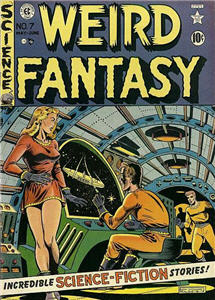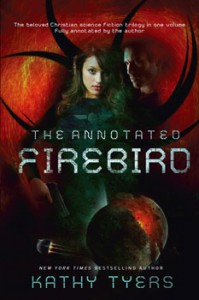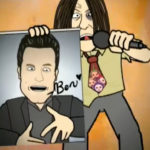Space Opera, Sci-fi, SF or ‘skiffy’?

Does the term "sci-fi" automatically make you think of something like this?
It’s alive. And it came to me yesterday via the post, one of three books. But when I set this one flat on my desk, I can watch from the side and see a little bubble between pages, flow from page to page, like a living thing … silently relaying to the next white line. Yes, the new Annotated Firebird, by Kathy Tyers and re-edited for Marcher Lord Press, is that thick.
So far I’ve only read the Firebird series once — and yes, it will be a series, starting next year, when Tyers expands beyond her original trilogy with Wind and Shadow (expected late 2011) and Daystar (2012). I look forward to delving into it again, with the new volume. Yet already I’ve begun reading through many of Tyers’ notes and details about her authorial thought processes. Early in the first novel, one of those notes entails the definition of space opera …
Here’s a footnote from my thesis paper regarding the term “space opera,” written in the exotic language of academia:
The term was coined by SF author Bob “Wilson” Tucker in 1941, who was comparing bigger-than-life, action-adventure science fiction with “horse opera,” the U.S. Western, and television “soap opera.” Bob Tucker, “Le Zombie” newsletter no. 36, January, 1941, 1. Photographic simile posted at http://www.midamericon.org/tucker/lez36i.htm (accessed May 5, 2008). The term has gained a measure of respectability; “SciFi” (pronounced “skiffy” by some SF publishing professionals) is now the more derogatory term.
[Hyperlink added to original.]
 This reminded me of something Tyers said in preparation for last month’s interview, which she gave me permission to relay to our audience. It began when I referred to Firebird as “sci-fi,” and she explained something I hadn’t considered — and which you might not have either.
This reminded me of something Tyers said in preparation for last month’s interview, which she gave me permission to relay to our audience. It began when I referred to Firebird as “sci-fi,” and she explained something I hadn’t considered — and which you might not have either.
I avoid the term “sci-fi,” and let me tell you why, in case you might want to drop it too.
I was told years ago, by a secular editor at a science fiction convention (and this has been confirmed by my experience within SFWA), that among serious professional writers, “sci-fi” is often scornfully pronounced (or even written) “skiffy,” and that for these serious folks, the term refers to substandard fiction like some of the stories that were published during the 1950s, often featuring helpless but voluptuous female laboratory assistants, bug-eyed human-eating monsters, and really bad science.
It was suggested that if I wanted to be taken seriously as a new professional in this field, I wouldn’t use that term at all, ever, amen. Obviously, that advice stuck with me.
I don’t know whether the advice is absolutely current – certainly there’s a TV network that uses it now – and there are lots of enthusiastic fans who either don’t want to take the time to say “science fiction” or else use the term hoping to sound like insiders. Still, “SF” is the more professional term, meaning “speculative fiction” and referring to both science fiction and fantasy. I don’t think anyone will ever notice if you don’t write or say “sci-fi,” but there is that super-serious contingent who will notice (and drop your credibility) if you do.
So as a favor to my friends, I try to let them know quietly, when an opportunity arises (as in your first question below). I don’t think it does any harm to avoid the term. It seems sad that we have to be politically correct among our fellow fans. Then again, we’re communication professionals.
[Only paragraph breaks added.]
So what have you seen in the industry so far?
Is sci-fi or skiffy viewed as a more-cornball pulp genre, whose covers feature men wearing biceps and spacesuits, women wearing little, and horrifying invader robots wearing women?
Or have perceptions of the sci-fi term been changing?






































Oddly, her reasons for not using “sci-fi” to label herself is eerily similar to why I don’t use the term “fantasy” much – and resisted calling my own writing that (still kinda do, to be honest). I admittedly don’t take sci-fi as seriously, nor all of fantasy. It’s the bug-eyed aliens and convenient quick-fixes, really. Evolutionary process involves a squid as a ‘higher life form’? Never mind where squids fall on the ‘evolution hierarchy.’ Squids and giant cockroaches? *blink* (You’ll notice even my DW critiques include that one.)
So what have you seen in the industry so far?
Three approaches from a writer perspective:
1) a serious approach (storylines, characters, and world avoid flippant treatment)
2) a non-serious, flippant approach (which I can’t take seriously)
3) a story in which they’re crazy, and they know they’re crazy (satire included; I’d even put some of DW in here)
Is sci-fi or skiffy viewed as a more-cornball pulp genre, whose covers feature men wearing biceps and spacesuits, women wearing little, and horrifying invader robots wearing women?
Amending my comment: Actually, I hear that more about fantasy than sci-fi. Say the phrase “adult fantasy” and people’s heads go straight to the gutter.
For me, the sci-fi stories that didn’t work had some combination of the following:
-flat, paper-doll characters with the personality of soy beans
-non-sensical plot lines (usually a character making a very stupid decision even I would know not to do)
-sterile, uninteresting story worlds (no imagination)
-too much reliance on technology as plot devices
-sentient robots (don’t ask; they’re funny, but they’re not people, ‘kay? It’s a very smart computer.)
Or have perceptions of the sci-fi term been changing?
See above.
And just for the record, I’ve probably watched more sci-fi than I’ve read (and probably didn’t always think of some of those as sci-fi anyway) – but I do actually like the genre. Heck, I’ve written it. (No, I’m not showing it. 😛 )
DW definately falls into self-parody at time, but it’s always very loving self parody. As far as sci-fi being depreciative, I don’t think it is any more than “fantasy” is
I don’t read much “sci-fi” but I do watch those types of movies. Who doesn’t love Star Wars? Or maybe the more recent stuff like Red Planet, iRobot, the Star Trek Generations movies (they were all good), The Sixth Day, Minority Report (sort of sci-fi), etc.
Maybe they’re not the most intricate plots or have the best characters, but they are enjoyable and memorable.
KC you’re in the minority — along with me — about all the Generations films being good. I’m one of the few who does appreciate Nemesis, certainly as storytelling even though it does contain some in-universe continuity errors. As for Insurrection, though, I’ve only seen it once. …
Somehow many of the potentially corny elements of similar stories in book form get lost when translated to screen in these ways. I wonder why or how that is.
I’d like to throw out a suggestion.
I’m part of a very encouraging, very helpful site called Holy Worlds for Christian speculative fiction writers. And of course the forum has a chat, and I must say, you know you’re on the chat of a writing forum when everyone has correct spelling and grammar. However, we are not immune to abbreviations. Everyone must submit to a three- to five-letter nickname. We never type out the entire name of our forum, “Holy Worlds;” we say HW. We’re the first to learn that HTTYD stands for How to Train Your Dragon. We also tend not to type out s-c-i-e-n-c-e f-i-c-t-i-o-n. Seriously, 14 letters, and we have this much more efficient alternative, sci-fi. No one thinks of it a derogatory. It’s just a shortened term for science fiction. Honestly, I’ve always thought of “space opera” as being a more derogatory term, since it brings to mind a specific subgenre that, despite some shiningly (cool, shiningly is a word) popular examples, has a bad rep.
Is the internet and the subsequent need for typing speed changing previously-held views of specific shortened terms? At the end of the day, I avoid the term “sci-fi” in my blog posts because I have been told of the stigma surrounding it. But in five, ten years?
As a post note. . . Now that I think about it, I’ve got my own expectation when the term “sci-fi” is used, but it’s of the speaker, not the reading material in question. When someone says sci-fi, I immediately think of then as young – 20s or teens. I’m not sure where that came from.
Ooh, meant to add this so that my thoughts could be viewed in context: I’m a teen, and said forum is mostly populated by 13 to 25 year olds.
I might be alone here, but I rather enjoy good, pulpy Sci-Fi. Look at the image at the top…it evokes wonderful ideas and concepts: Space exploration, high adventure, unknown worlds, weird and strange organisms on distant planets, danger, adventure, daring, heroism, and piles and piles of pure fun.
So I ask, is that supposed to turn me off somehow? 😉
Ethan, you’re not alone. I like that kind of stuff, just for the pure pleasure of it, as do many others, apparently. Otherwise we would not have the “Captain Proton” black-and-white pulp-sci-fi-serial-style holodeck program in Star Trek: Voyager, or even a fiction-within-fiction pulp-sci-fi comic-book referenced in my own work-in-progress! (This is also why I enjoy The Tick cartoons.)
Yet I can understand some authors and publishers wanting to distinguish more-serious stories from that fun, yet somewhat frivolous, genre.
As I recall the 1960s, the people who developed science fiction never called it anything but SF. I’m looking up at the bookshelf to a copy of Earth Abides by George R. Stewart with that yellow Gollancz dust jackeet. It says SF.
Sci-fi came as a term from the outside, when media types discovered this odd genre and wanted to report on it back to the wider world. This was often under the influence of movies, which were regarded as a degenerate form of SF. Here’s the difference: SF is full of ideas. sci-fi is full of BEMs. That was the original difference.
I can’t say how the terms have travelled since then. Sci-fi seems to have triumphed in popularity. It’s just another example of the common culture imposing itself on a smaller group with their own language. For those of us who grew up with Asimov, Aldiss, Clarke, Heinlein, etc, sci-fi will always mean something populist and superficial, mainly movies.